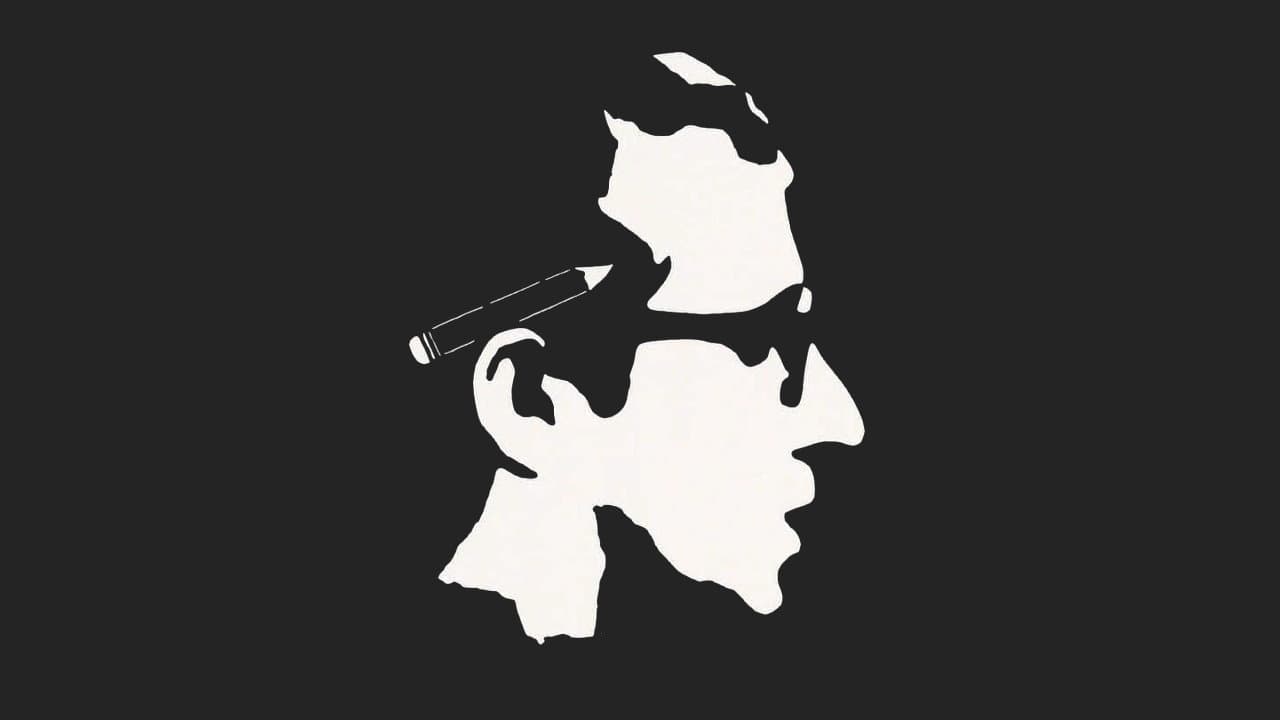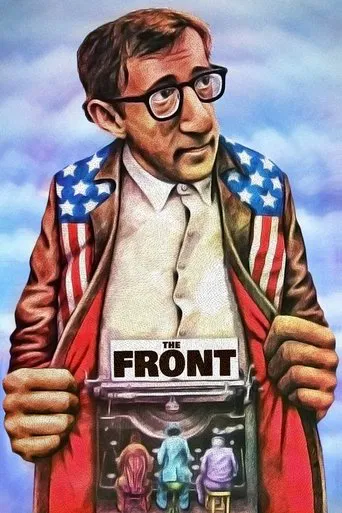

During the height of the communist scare, writers were being blacklisted it seems for purring explanation points where censors thought a period should be. For that, writers who wanted to work but couldn't hired someone they referred to as a "front". The idea of a pseudonym to work under a different name had been caught onto, so someone had to pretend to be them so they could earn some money. When greasy spoon employee Woody Allen gets the opportunity to earn a few extra dollars from blacklisted writer Michael Murphy, he grabs it, only to find out about the value of personal freedoms and rights taken away from those who don't agree to the status quo. Along the way, he encounters a blacklisted comic (Zero Mostel) who influences him in getting more involved in the fight but is secretly spying on him in an effort to provide a name so he can continue working. It's obvious, however, that the committee is simply using him and will betray him in the end, which leads up to a very touching scene at the end. A smart, often touching and funny drama, this takes on its own industry and attacks it for the careers it destroyed, the dreams it broke, and the freedoms it violated. Forty years later, it is equally valid as a mixture of liberal politics and p.c. attitudes threaten to censor people, not only in writing but in freedom of speech as well. Zero Mostel, for example, was one of several people named by Broadway director/choreographer Jerome Robbins, and when they were reunited in 1962 for "A Funny Thing Happened on the Way to the Forum", Mostel greeted Robbins with "Hello, loose lips", which adds to the passion he puts towards the characterization here. While this has all the markings of a Woody Allen film, it only stars him, and he is excellent. Even though he did not write the screenplay, it seems like each and every word came off of his pen. The real creative team behind the film were actual blacklist victims, including director Martin Ritt and writer Walter Bernstein. Mostel is terrific in a role that resembles his own real life situation, but unlike Mostel in real life, his character was never able to rebound and find bigger triumphs. I find that this holds up even better today to give us warnings that freedoms of thought and personal ideals are much more important than the liberal battle of the day and the censorship police who only will allow freedom of speech when it agrees with theirs.
... View MoreI had heard about "The Front" many years ago but had only recently had the opportunity to see it. The recommendation to see it came from a book which detailed the films that the author thought, in hindsight, SHOULD have been awarded "Best Picture" ("Rocky" won in 1976).There is so much talent here, both on screen and off--and yet the sum is not greater than its parts. One would think that a film about the 1950s entertainment blacklisting written and produced by those who not only lived through it but were also adversely affected by it would be thoughtful, serious, complex and sober...or satirical, ascerbic, and horrifying.Instead the film, as a whole, comes off as a "TV movie of the week" with a feel of having been put together by those who only heard about the blacklisting debacle fifth-hand. There is an occasional glimpse of the lives that were ruined: Zero Mostel's downward spiraling character and his suicide is easily the best element in the film, for example.But the focus is not on the blacklisted characters themselves but on Woody Allen's character, a schlub who with turtle-like drive tries to deflect the ramifications of his willingness to act as a "front" for three of his friends, all blacklisted writers, until all of a sudden, with literally 30 seconds left in the film, he has a change of heart: he believes! And he goes to jail a conquering and celebrated hero (who gets the girl) in a sappy ending this subject matter doesn't deserve.Furthermore, everyone is mostly reduced to a two dimensional portrayal: the network executives, the token girlfriend, the blacklisted writers themselves AND the agents leading the persecution resulting in the blacklistings. Granted the producers had an axe to grind against those who initiated the witch hunts...but if you're going to have an enemy the audience can take seriously, don't make them cardboard cutouts: that's what comic books are for.I wanted to like this film. But the irony is that the "Front" refers to writers not able to produce great works due to censorship based on their political philosophies--yet none of the characters would submit this screenplay in real life. Unfortunately, the real life victims did.
... View MoreThe McCarthy blacklisting era was a most peculiar time in America. On the one hand you had conservatives who felt fully justified in defending the rights and freedoms of Americans by supporting an ad hoc system that stripped some Americans of their rights and freedoms without any sort of due process or legal avenues. On the other hand, you had liberals who defended the rights and freedoms of those who advocated a political system that by its nature would strip Americans of their rights and freedoms. And there were quite a few people who were trapped in between, forced to choose either their freedom to think for themselves or their right to live their lives in peace.The only people not greatly effected it seems were the source of the confrontation, the communists. Though few in number and largely ineffectual as a group (at least, in America), they no doubt sat back and amused themselves as the country was being forced into two bitter camps. Had they had any real power within the United States, all the hub-bub about the communist influence might have served a purpose. But in reality it was hysteria over a non-existent threat, or a barely existent one. In hindsight, the panic over the Red Menace seems like the premise for a comic farce.THE FRONT isn't such a farce. Though it does star Woody Allen during his "early, funny" years and it is structured like a comedy, THE FRONT is a drama. It uses the talents of many who were blacklisted –- director Martin Ritt, screenwriter Walter Bernstein, and actors Zero Mostel, Herschel Bernardi, Joshua Shelley and Lloyd Gough -- and it tries to focus on those in the middle who lost their livelihoods and reputations because they were considered "pink," ordinary citizens whose paths crossed those of others who may or may not have been communists. Guilt, or at least proof of it, was irrelevant; the mere suspicion of being a communist sympathizer was enough to deny individuals the right to work in their chosen field, the cost being their careers, their families and even their lives. In the view of the House Un-American Activities Committee, you were either on their side or a threat to the very fiber of the American being. It was mostly played out in the political arena, but as with most politics it seeped into the pop culture. Perhaps because the government had relied so much on the media for propaganda purposes during WWII, the fear of its power was strong.In THE FRONT, Allen plays Howard Prince a part time bookie. When a friend of his, a writer for a network TV show, gets blacklisted, the friend persuades Howard to act as his proxy. The writer will create the scripts for the show, but Howard will submit them under his name, for a cut of the commission. The scam works so well that soon Howard is fronting for several other writers as well –- and Howard's reputation as a prolific and versatile author starts to grow. The complications come when Howard is expected to do on-the-spot rewrites of the material, and when he is suspected of red ties due to his friendship with the real liberal writers. As he sees first hand the dangers of the blacklisting, he also grows a conscience. Not a bad premise for a movie, even a comedy.One would think, with the involvement of those who were scarred by the blacklisting playing such a prominent role in the film, that THE FRONT would pulsate with a certain degree of rage. But it doesn't; the film isn't so much angry as it is wistful. It is not a question of the honesty of the material so much as the quiet feeling of hopelessness that pervades the story. The story unfolds in a slow, deliberate fashion, occasionally sticking in a joke or two, but mostly just reliving the past in a sad monotone. Perhaps it is supposed to be a reflection of the era the film is about, the 1950s, an era of passivity. Or maybe it is a reflection of the era in which the film was made, the 1970s -- after the chaos of the 1960s, maybe McCarthyism had just lost its power to scare. Either way, neither Ritt nor Bernstein inject much passion into the tale. Likewise, the characters lack depth; the bad guys who support the blacklisting are cold and mechanical (heaven forbid they might be acting out of genuine patriotism), while the good guys are either pure and passionate in their left-wing leanings or guileless innocents bewildered by it all. Thoughtful and low-key, THE FRONT is certainly sincere, but it isn't insightful and doesn't carry much of a punch.Even the big finale lacks power; after playing an ineffectual verbal game of cat and mouse with a HUAC subcommittee, Howard drops the "F-bomb" in a moment that is supposed to be shocking. Though it is jarring, it is because it is so pointless as a gesture. Did Ritt and Bernstein really think that uttering the F-word would jolt audiences in 1976? Even now, are we suppose to see such a foolish gesture as an act of courage on Howard's part? It is a key moment in the story and comes off as being just, well, stupid. In the end, Howard ends up going to jail, presumably on contempt of court charges; but is Howard's childish act of defiance really an heroic action? He takes a stand, but doesn't make much of a point. And neither does the movie.
... View MoreWoody Allen has always had the power to make people laugh. However in 1976, he allowed his serious side to shine as he played Howard Prince a down-on-his-luck average guy. The movie, " The Front " tells the story of a simple unemployed man, financially strapped who is asked by Black listed writer Alfred Miller (Michael Murphy) to submit a play to the Television studios, using his own name. With little concern, Howard does and is surprisingly accepted and paid. In time, other writers give him additional plays and for a percentage of their royalties, Howard gets the credit. He is so successful he comes to the attention of HUAC (House on UnAmerican Committee) and is asked to co-operate by revealing names of friends who may be affiliated with communists organizations. One of his friends is comedian is 'Hecky Brown' (Zero Mostel) a likable and struggling comic who tries to stay out of trouble but is threatened, coerced and driven to suicide by the powerful yet nameless shadowy men working for Joseph MaCarthy. Howard Prince is no writer, but he is a man of courage and conviction who exemplifies the courage necessary to combat the malignant evil which can arise when dark powers such as Senator MaCarthy go unchecked. Allen is superb and for his effort has given this movie the status of a social Classic which stands of its own accord. ****
... View More